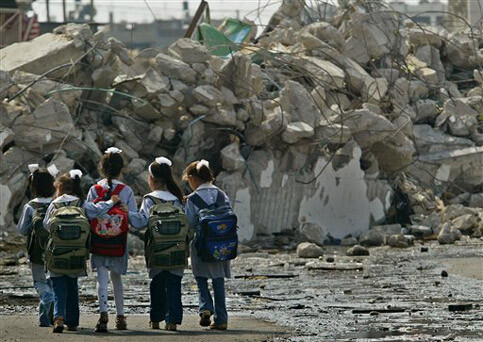United Nations Children's Fund 2 September 2005

In the occupied Palestinian territories, just the act of reaching school is an ordeal and frequently very risky. (PCHR)
JERUSALEM -– More than one-million children returned to school today after a summer break which saw many developments affecting children in both West Bank and Gaza Strip. This is a very important day for the children, for the parents, for the teaching staff and for the Ministry of Education and Higher Education (MoEHE). All have done remarkable work keeping schools open and functioning during difficult times.
“We celebrate a ‘hello-to-school’ for the many children coming into classrooms for the first time and welcome children back-to-school. Children in the Occupied Palestinian Territory (OPT) remain some of the most committed to education in the region. Unfortunately some children will not start school as they have a right to and some older children will not return back to school, many of whom will perhaps not see the inside of a classroom ever again. We need to work hard to help ensuring that all children can exercise their right to a quality education” said the UNICEF Special Representative, Dan Rohrmann.
Aside from maintaining their enthusiasm for learning amid a difficult economic environment, many students in OPT go to school under very challenging circumstances. To help address these issues UNICEF this year is supporting the MoEHE in a wide range of issues - from improving the quality of education to providing essential learning supplies, and supporting teacher training.
“In OPT, just the act of reaching school is an ordeal and frequently very risky. As schools re-open for the year, UNICEF is supporting the MoEHE in achieving a child-friendly and stimulating learning experience. UNICEF will help provide educational supplies and when children cannot reach school we will help ensure that the learning can continue at home until the children can reach school again and then catch-up,” said Rohrmann. Self-learning worksheets in the areas of math, Arabic, science and English are very popular with children, parents and teachers since they supplement existing textbooks.
Through the Child-Friendly Schools initiative, schools are made more user-friendly. Improvements range from adding sanitation facilities and improving extra-curricular programmes to special classes aimed at reducing violence in schools. UNICEF and the United Nations Development Programme (UNDP) work together on the school rehabilitation efforts.
More Information
Related Links